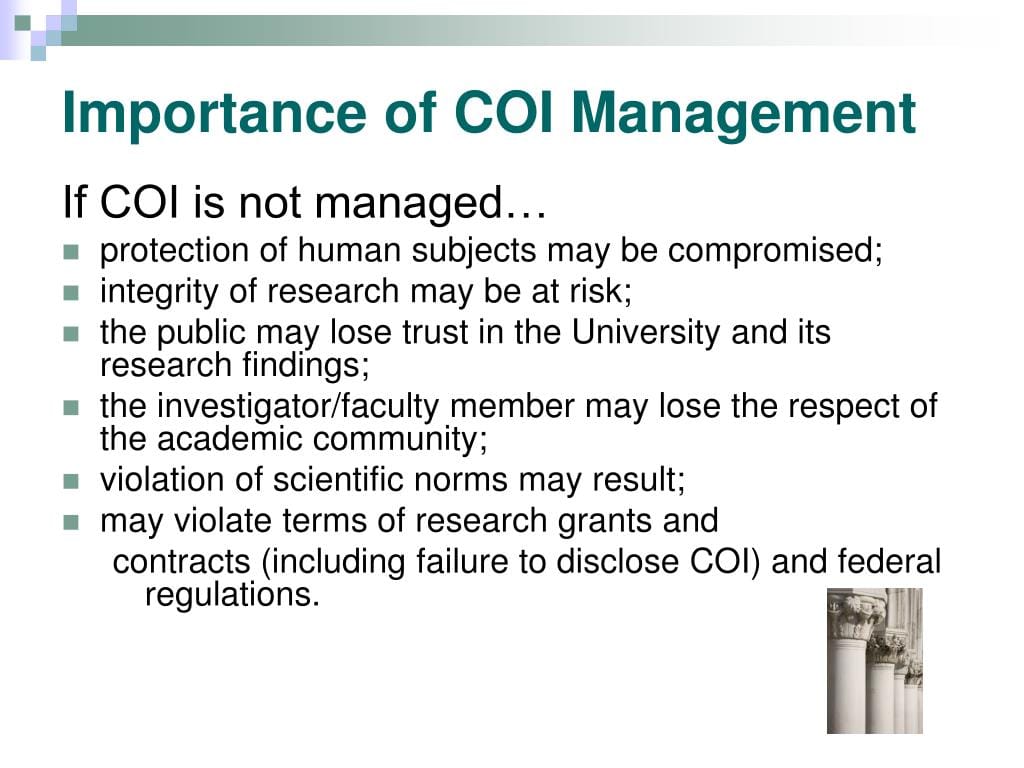A Conflict of Interest (COI) in research can subtly skew results, undermining the integrity of a study. A well-crafted COI Management Plan acts as a safeguard, proactively addressing potential biases and ensuring research remains objective and trustworthy. This guide explores the essential elements of a robust COI Management Plan, outlining its purpose, components, best practices, and the broader implications for research integrity.
Understanding the Importance of COI Management
COI management plans safeguard research integrity by proactively addressing potential biases stemming from financial interests or relationships. A COI arises when a researcher’s external interests, such as financial investments or personal relationships, could potentially influence their research activities or the interpretation of findings. This can compromise the objectivity of the research and erode public trust in scientific discoveries. Effective management is not merely a matter of compliance; it’s about fostering a culture of transparency and accountability in research.
Key Components of a COI Management Plan
A robust COI Management Plan serves as a roadmap for navigating potential conflicts, ensuring transparency and accountability in research. It typically comprises four key components:
1. Identification and Disclosure: Transparency is Key
Researchers must proactively disclose any potential COI, regardless of how insignificant it may seem. This includes financial interests (e.g., equity in a company whose product is being studied, consulting fees), personal relationships (e.g., family ties with research participants), and professional affiliations (e.g., membership on a relevant company’s advisory board). Institutions often provide specific guidelines and forms for disclosure, requiring researchers to report annually or at the start of a new project. NC State University offers a helpful example of such guidance.
2. Assessment: Evaluating the Potential for Bias
Once disclosed, potential COIs are reviewed by an independent body, such as an Institutional Review Board (IRB) or a dedicated COI committee. This review assesses the severity of the conflict and its potential to influence the research. Factors considered include the nature of the interest, the magnitude of the financial stake, and the researcher’s role in the project. MUSC provides insights into how various committees collaborate in this process.
3. Management Strategies: Mitigating the Risks
Based on the assessment, specific strategies are implemented to minimize the risk of bias. These may include:
- Independent Data Analysis: Engaging a third party to analyze the research data.
- Blinding: Masking certain aspects of the study from the researcher.
- Recusal: Removing the researcher from specific decision-making processes.
- Public Disclosure: Transparently disclosing the COI alongside research findings.
- Divestiture: Requiring the researcher to sell financial holdings.
SMART IRB offers further guidance on mitigating COIs in complex research scenarios.
4. Monitoring and Enforcement: Ensuring Ongoing Integrity
COI management is not a one-time event; it requires ongoing vigilance. Institutions implement monitoring mechanisms to ensure adherence to the management plan. This may involve periodic audits of financial disclosures, reviews of research activities, and procedures for reporting potential violations. Clear consequences for non-compliance are essential, reinforcing the importance of ethical conduct.
Best Practices for Effective COI Management
Beyond the core components, certain best practices can strengthen COI management:
- Proactive Disclosure: Encourage researchers to disclose even perceived minor conflicts to ensure transparency.
- Independent Review: Establish impartial review bodies with expertise in COI assessment.
- Education & Training: Provide regular training to help researchers understand COI and its management (see HCCA resources).
- Consistent Monitoring: Conduct ongoing audits and reviews to detect potential issues early.
- Institutional Support: Create a supportive environment that prioritizes ethical conduct and provides resources.
- Open Communication: Foster a culture where discussing potential conflicts is encouraged and normalized.
- Clear Guidelines: Develop comprehensive policies and procedures for consistent COI management across the institution (refer to University of Illinois).
- Regular Review and Updates: Adapt the COI management plan to address evolving research practices and regulations.
Why Bother? The Benefits of Managing COIs
Implementing a robust COI management plan yields numerous benefits:
- Boosts Credibility: Minimizing bias enhances the trustworthiness and impact of research findings.
- Builds Public Trust: Transparency fosters confidence in the objectivity and reliability of research.
- Ensures Ethical Conduct: Aligns research practices with ethical principles and promotes integrity.
- Protects Researchers: Safeguards researchers from accusations of bias and potential legal ramifications.
- Facilitates Collaboration: Enables smoother collaborations by proactively addressing potential conflicts.
- Strengthens Institutional Reputation: Demonstrates a commitment to ethical research practices.
If you are eager to read more about the short story that inspired the Twilight Zone episode of the same name, check out the veldt pdf and find out how a family’s increasing obsession with technology leads to a tragic end. Did you know that serendibite is a rare gemstone that is often confused with scapolite? Learn more about serendibite and its unique properties that make it a valuable addition to any jewelry collection.
PHS Regulations on Financial Conflict of Interest
The Public Health Service (PHS) has specific regulations (42 CFR Part 50 Subpart F) governing financial conflicts of interest (FCOIs) in PHS-funded research. These regulations require researchers to disclose significant financial interests, institutions to review and manage identified FCOIs, and ongoing monitoring of compliance. This framework helps ensure the objectivity and integrity of research influencing public health decisions. University of Michigan offers more information on this topic.
Ongoing Evolution and Future Directions
While current COI management practices strive to address the most common scenarios, the field is constantly evolving. Ongoing research may reveal new insights into the subtle influences of bias, necessitating revisions to existing guidelines. Emerging technologies, such as artificial intelligence and big data analytics, present new challenges and opportunities for COI management, requiring innovative solutions. The increasing complexity of research collaborations, particularly international partnerships, adds further layers to the COI landscape. Continuous dialogue, research, and adaptation are essential to ensure COI management remains effective in upholding research integrity.
- Jesus Bible: Discover Jesus’s Story Throughout Scripture - April 27, 2025
- Don Luis: Unraveling the 16th-Century Virginia Mystery - April 27, 2025
- Captain J’s Kauai Tours: Unforgettable Na Pali Coast Adventures - April 27, 2025
















